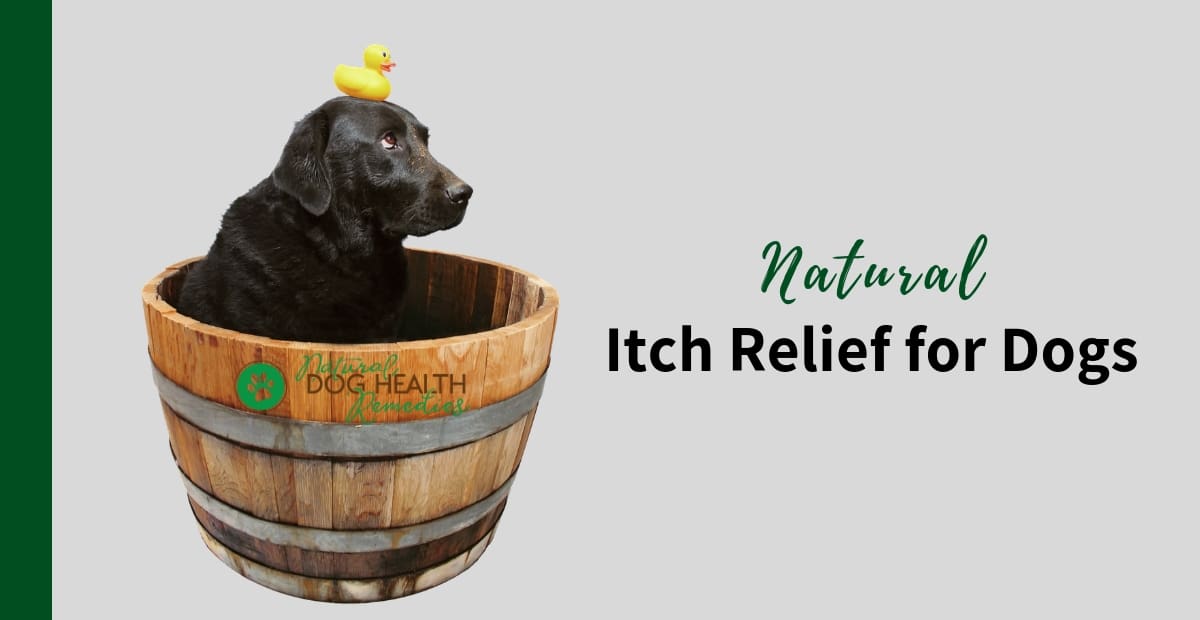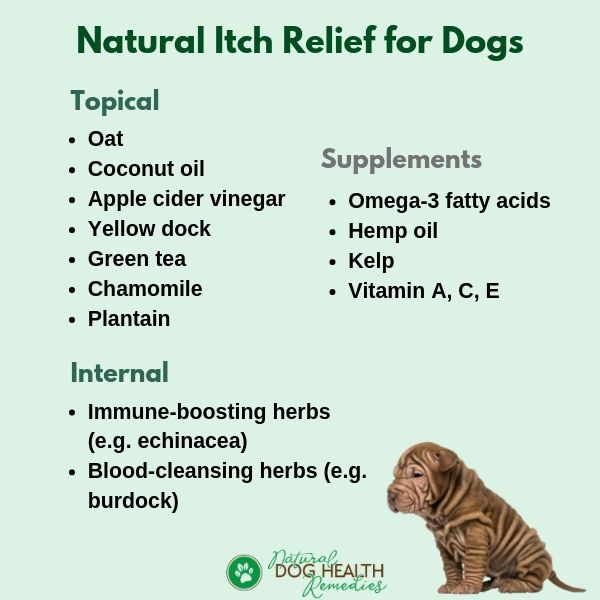Natural Itch Relief for Dogs
(FTC Disclosure: If you make a purchase via a link on this page, I may receive a small commission, at no added cost to you.)

Overview
If your dog is constantly scratching, licking and chewing her paws, and/or rubbing her face against furniture, you know that she has itchy skin.
Before even considering how to ease your dog's itch, the most important thing to do is to get her to the vet to try to identify the underlying cause. If the cause can be identified and dealt with, the itching will eventually go away.
While your vet is treating the root cause that is making your dog itchy, you may want to consider using some natural remedies, such as herbs, vitamins, and other supplements, to help soothe your dog's itchy skin.
Let's take a look at some of these effective natural itch relief for dogs.
Topical Dog Itching Remedies
These topical remedies are effective in alleviating itching in dogs:
- Oat: If your dog's itch is NOT caused by yeast infections, you can use oat to help alleviate her itch.
(The reason why oat should NOT be used if it is a fungal problem is, oat is a grain that contains rich sources of carbohydrates (sugars), and as you know, yeasts thrive on sugars!)
You can apply an oatmeal paste to the affected area(s). To make the oatmeal paste, cook the oatmeal in water until it is in a loose and wet paste form. Let it cool and apply it liberally to your dog.
Alternatively, washing your dog with a shampoo that contains oat can also help alleviate the itch.
A Natural Oat Shampoo for Dog Itchy Skin
(Affiliate link) Doc Ackerman's Colloidal Oatmeal with Aloe Vera Shampoo for DogsThis shampoo is effective in providing relief in dog itchy skin, skin problems such as excessive dryness, dandruff, and certain types of dermatitis (e.g. hot spots). It can also be used regularly to help control and lessen bad body odors in dogs.
- Coconut Oil: If your dog's itchy skin is dry and flaky, or if your dog is susceptible to recurring bacterial or yeast infections, trying doing a whole body coconut oil treatment on a regular basis. This can keep your dog's skin nourished and healthy, as well as keep pathogens such as yeast and bacteria at bay.
Visit this page to see how to do a coconut oil treatment.
- Apple Cider Vinegar: ACV has antibacterial and antiseptic properties. It can be used as an after-shampoo rinse for dogs with itchy skin. Read my article on Apple Cider Vinegar for Dogs for more information.
- Yellow Dock: Yellow dock is an herb that is a great itch relief for dogs.
Add one tablespoon of the dried herb to 2 cups of boiling water. Let it sit and cool down. Strain off the herb and use the liquid as a rinse.
- Green Tea: You can also make a simple green tea rinse to alleviate your dog's itching. Steep a couple of green tea bags in 2 cups of hot water. Discard the teabags. Let the tea cool down and pour it on your dog. Let it drip dry.
- Chamomile / Calendula: If your dog is itchy and her skin is reddened, make a rinse of chamomile tea or calendula tea. These herbs can quickly cool and soothe hot, irritated areas on the skin.
Alternatively, if you have a tincture of calendula, you can make a spritz by adding 10 to 15 drops of the tincture to about 4 oz. of distilled water in a spray bottle. Shake well and spray the affected areas as often as necessary.
- Plantain: This herb is also good for skin irritations such as itching and hot spots.
Make a tea of Plantain by adding 2 tablespoons of the dried herb to about one pint of boiling water. Let it steep, covered, for 15-20 minutes. Wait for the tea to cool down and strain it before applying it on your dog.
To apply, just dip a piece of gauze or cloth into the tea and hold it to the affected areas for about 10 minutes.
Dog has Itchy Paws?
If your dog has itchy paws, set up a foot soak to clean off whatever irritants there are on the paws, and to discourage the growth of bacteria and fungus. Visit this page to see how to make some simple foot soaks.
Natural Supplements for Dogs with Itchy Skin
Some natural supplements are essential if your dog has itchy skin. They include:
- Omega-3 Fatty Acids: Omega-3 fatty acids are beneficial to dogs with itchy skin because Omega-3s are anti-inflammatory and can therefore help alleviate skin irritations such as itching.
 Unfortunately, many dog foods do not contain sufficient amount of Omega-3s. Therefore, it is essential to supplement your dog food with Omega-3s.
Unfortunately, many dog foods do not contain sufficient amount of Omega-3s. Therefore, it is essential to supplement your dog food with Omega-3s.Fish oils, such as salmon oil, are rich sources of fatty acids.
- Hemp Oil: Hemp oil is also rich in Omega-3 and Omega-6 fatty acids, which are anti-inflammatory.
If your dog has itchy dry skin and has other skin irritation issues, such as eczema, try using hemp oil. Visit this page for more information on this oil.
- Kelp: Sea vegetables (such as kelp) and micro-algae (such as spirulina) are rich in trace minerals and vitamins that are beneficial to the skin.
Here is a simple herbal mix you can make for your dog to improve his/her skin and coat:
Mix equal parts of powdered kelp and spirulina with the powder form of these dried herbs: nettle, alfalfa, calendula and dandelion root.
Add this mixture to your dog's food (1/2 teaspoon per 10 pounds of body weight per day) for about 2 weeks, then reduce the amount to a maintenance dose of 1/2 teaspoon per 25 pounds every other day.
- Vitamins A, C, and E: These vitamins are also effective in helping to alleviate dog itching.
Vitamins A and C strengthen the immune system. Vitamin A can facilitate healing of sores, whereas Vitamin C may help relieve allergies. Vitamin C works with Vitamin E, enhancing the antioxidant effect in E, which is also anti-inflammatory.
A Product That Makes Your Dog's Coat Healthy
This formula is a combination of borage oil, flaxseed oil, fish oil and natural Vitamin E. It contains the essential fatty acids needed for maximum health and shiny coat.
Herbal Remedies for Itchy Dogs (Internal Use)
A lot of dog skin problems, including itching, are signs of a poor immune system.
Immune-Boosting Herbs
Immune-boosting herbs (such as echinacea, Oregon grape), as well as herbs that have blood purifying effects (e.g. red clover, sarsaparilla), can be given to your dog to detoxify and cleanse her blood and strengthen her immune system.
An Immunity Booster and Blood Cleanser
This herbal supplement contains herbs such as nettle, red clover, burdock root, and more, and is effective in boosting a dog's immune system while cleansing the dog's blood.
Use herbs for detoxification
Just like us, dogs have to be "detoxed" as well.
A very good and safe herb that can be used for detoxification is burdock root. It helps remove toxins from the body, and it also counteracts dry skin. Dried burdock root can be sprinkled on your dog's food for this purpose.
Also see this page for more ways to detoxify your dog.

Other Things You Can Do to Help Your Itchy Dog
Reducing Environmental Toxins
While treating the dog for his itchy skin, it is equally important to try to reduce or even eliminate environmental toxins that may be causing the itchy skin problem.
As much as possible, eliminate dog products that may contain harmful substances and chemicals.
For example, some flea collars or dips have been proven to contain toxic chemicals that are not safe for dogs, people and the environment.
Stop using them. Fleas and other parasites can be controlled in other safer and environmentally-friendly ways.
Similarly, avoid using pesticides, weed-killers, etc. in places where your dog frequently hangs out.
Even household products such as carpet cleaners, certain detergents, air fresheners, etc. can contain toxins that are harmful to dogs and cause skin irritations. Use products with natural ingredients if possible.
Eliminating Stress
This is one aspect that many people tend to overlook.
Stressed dogs are susceptible to itchy skin irritations and problems.
The bad news is, dogs are very sensitive to the emotional feelings around them. They can sense our feelings and they empathize with us. If we feel stressed, they feel stressed. If we are sad, they look and feel sad! If there is tension and hostile feeling in the room, they can pick that up too!
Also, loneliness, boredom, and lack of exercise will also cause stress to our dogs.
The bottom line? Lead a stress-free life ourselves and our dogs will be stress-free too!
Is The Dog Food Making Your Dog Itchy?
If your dog is suffering from itchy skin, you should also take a close look at his diet.
Diet may be related to a dog's itchy skin due to two possible reasons.
First, the dog may be allergic to one or more ingredients in the food. Second, the diet may be of poor quality or poor nutritional value.
Food allergies can cause itching to dogs all year round, and the condition doesn't go away even when treated with corticosteroids.
The only way to stop the itching caused by food allergies is to find out the food item(s) causing the itch and eliminate such items from the diet.
As regards quality and nutritional value, the best diet is no doubt a balanced home made diet, either raw or cooked.
If you cannot cook for your dog every day, be sure to find a balanced, natural, and high-quality food. Read the label. Avoid artificial preservatives, colors, flavors, and other chemicals that very often could trigger itching and other allergic reactions in dogs.

Some Final Thoughts...
- It is heart-wrenching to see our dog suffer - especially if he keeps scratching himself until he bleeds. It might be tempting but try not to scratch your dog's itchy spot, and try not to rub the skin with a towel. This will only aggravate the itchy condition.
- Also, you may think that using conventional anti-itch drugs such as antihistamines like Benadryl® can bring faster relief. True, these drugs seem to work faster, but they do not address the underlying problem.
In the long run, your dog's immunity will be weakened further and the skin irritations will return, each time worse than before.
- Using the above suggested natural itch relief for dogs works, but it takes longer to see the result. However, the result is usually long-lasting. So, be patient!
C.J. Puotinen, Natural Remedies for Dogs and Cats (Keats Publishing, 1999).
M.L. Wulff-Tilford and G.L. Tilford, Herbs for Pets (Bowtie Press, 1999).
M. Goldstein, The Nature of Animal Healing (Ballantine Books, 2000).
R.H. Pitcairn, The Complete Guide to Natural Health for Dogs and Cats (Rodale, 2005).





